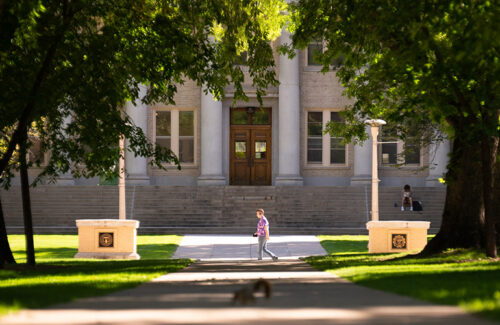Pivot Energy, a national renewable energy independent power producer, is developing a 5.75-MWDC virtual net metering solar project for Colorado State University (CSU).

Credit: Colorado State University
Through the partnership, Pivot Energy will build a ground-mounted solar project in Weld County. The electricity produced will be transmitted directly to the Xcel Energy electric grid, which serves much of Colorado. All of the renewable energy credits will be transferred to CSU without increasing its electricity costs, helping the university meet its sustainability goals.
Virtual net metering is a program made possible by Colorado Senate Bill 21-261, which passed in 2021, which lets organizations benefit from energy produced by offsite solar installations. Under a 20-year subscription agreement, CSU will use renewable electricity generated by the virtual net-metering solar project that Pivot will develop, construct, own and operate, without needing to install solar onsite.
“We are very excited to announce this agreement with Pivot Energy, as it significantly advances CSU toward our goals of utilizing 100% renewable electricity by 2030 and carbon neutrality by 2040,” said Campus Energy Coordinator Stacey Baumgarn. “When this project is completed and begins delivering renewable electricity, CSU will be 11 million kilowatt hours a year closer to our 100% renewable electricity goal, at no net cost to the university.”
Construction is expected to begin next winter and be completed during the fourth quarter of 2026. Once operational, the solar project will generate the equivalent of powering nearly 1,200 homes annually with enough solar panels to fill more than four-and-a-half football fields.
“We’re proud to partner with Colorado State University on this new and impactful solar project that advances renewable energy in Colorado,” said Matt Brenn, director of community solar subscriptions at Pivot Energy. “Supporting CSU’s renewable energy goals with locally generated solar power is a significant example of how educational institutions can lead the way toward a carbon-free future.”
In 2015, CSU was the first university in the world to receive a Platinum rating in the Sustainability Tracking Assessment & Rating System developed by the Association for the Advancement of Sustainability in Higher Education. In 2024, CSU gained another top-four ranking in AASHE’s Sustainable Campus Index and celebrated its 11th straight year earning a perfect score in the Green College Honor Roll rankings by The Princeton Review.
Currently, about half of the electricity CSU uses – including what CSU purchases from utilities and what it produces on its campuses – comes from renewable sources, and Baumgarn said the new solar electricity provided via the Pivot agreement will increase the amount of CSU’s solar portfolio by almost 50%. He added that meeting the 2030 goal of 100% renewable electricity includes more than just acquiring more renewables like solar and wind; the efforts also involve reducing CSU’s electricity use – through continuous improvements in energy efficiency and energy conservation in existing buildings.
News item from Pivot Energy


















